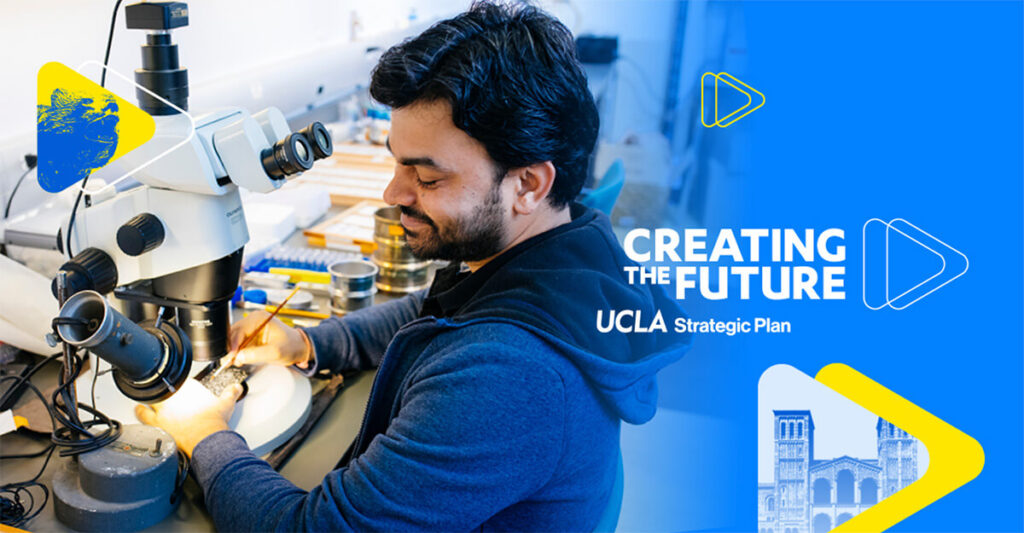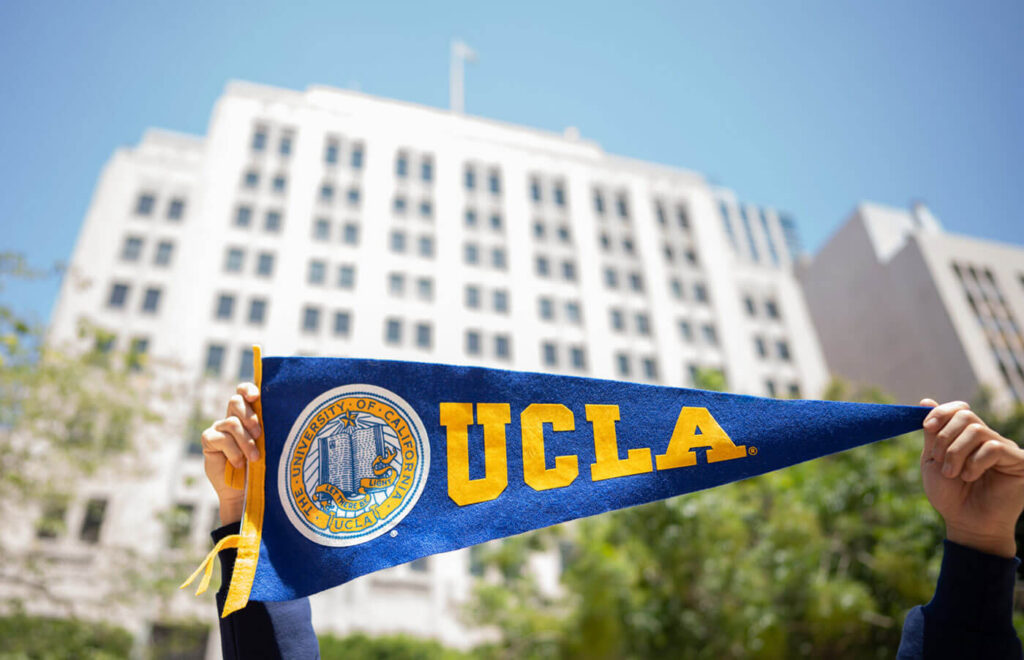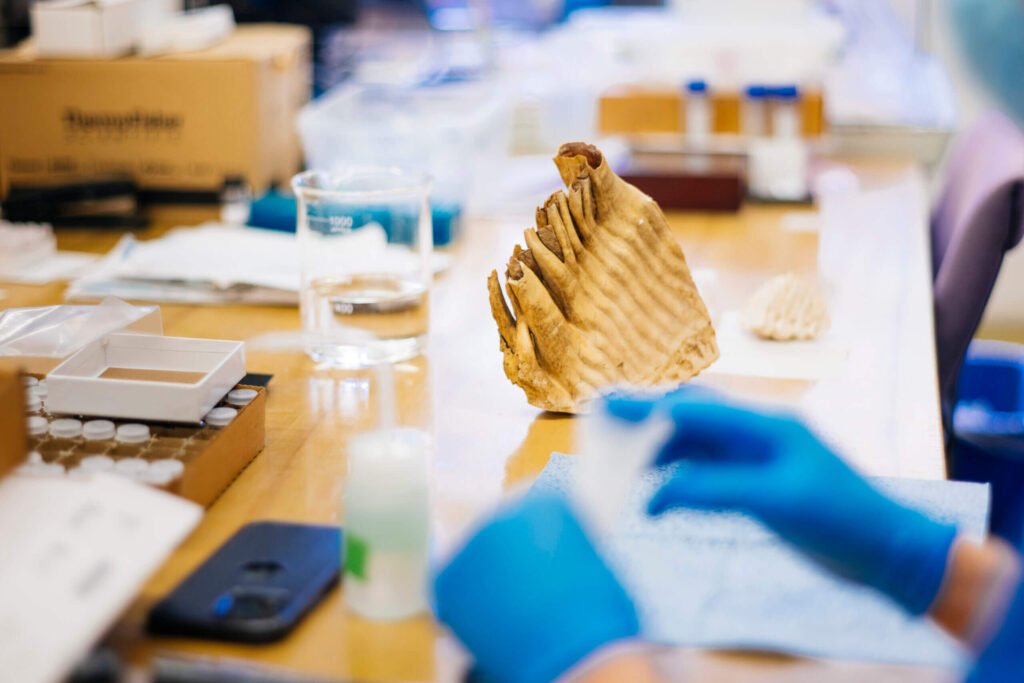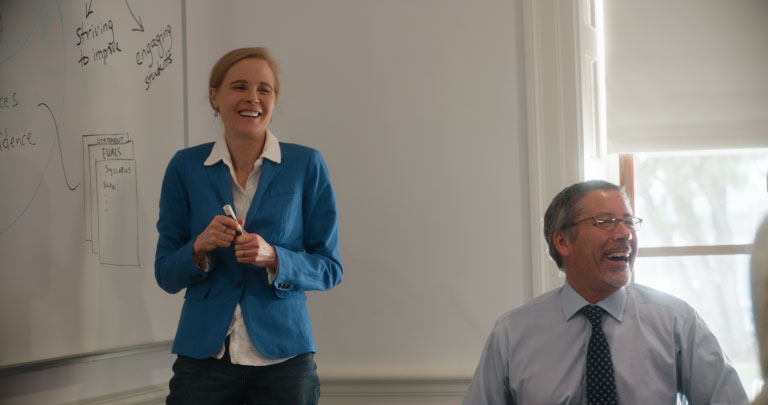
We begin the new year with exciting news — our university recently acquired the former Westside Pavilion mall, with plans to turn it into the state-of-the-art UCLA Research Park.
This acquisition aligns with several of the goals in our new strategic plan, which was announced this past fall. The plan has many other components that will determine the course of UCLA in the years to come. In this issue of my Quarterly Update, I offer a look at some of the most compelling projects across our strategic plan’s five focus areas.
Thanks are due to so many people who played parts in formulating and articulating the plan. But I want to express deepest gratitude to UCLA Executive Vice Chancellor and Provost Darnell Hunt for his leadership of the strategic planning process.
In this issue
Goal 1: Deepen Our Engagement with Los Angeles
Goal 2: Expand Our Reach as a Global University
Goal 3: Enhance Our Research and Creative Activities
Goal 5: Become a More Effective Institution
Goal 1: Deepen Our Engagement with Los Angeles

UCLA’s close ties to the L.A. area provide remarkable reciprocal benefits for both our institution and the city. Our first strategic plan goal invites us to double down on those ties, bringing UCLA into closer connection with the diverse communities that surround us, allowing our students and scholars to engage more deeply and have a more substantial impact in the region through their research, teaching and service.
Our acquisition of a historic downtown L.A. building this past June was a major step in realizing this vision — but it is not the only project in the works.
In addition, UCLA is establishing a Community Engagement Advisors Network and appointing a Special Advisor to EVCP Darnell Hunt on Community-Engaged Scholarship — two efforts that will help break down institutional barriers, promote opportunities for community-engaged teaching and research and coordinate some of our activities in the region. We are also building structures to support the launch of new community-engaged courses that connect students to L.A., grants to incentivize community-engaged research in the city, and a summer tuition waiver for certain students participating in unpaid internships in the area.
I am also very excited about the launch of a new “Quarter in L.A.” program currently in development and slated to launch next year. This program will offer UCLA undergraduates a one-of-a-kind learning experience combining an internship in a field relevant to their professional aspirations, leadership development training, and a deep dive into the social, cultural, and economic issues facing the city. Rather than only studying Los Angeles in an academic way, students will have the chance to fully immerse themselves in the L.A. experience, collaborating with people and organizations throughout the region and helping them build the skills and knowledge to contribute to the city — now and in the years ahead.
We envision a future in which UCLA is fully integrated into the fabric of Los Angeles, working with communities to drive positive change in this dynamic city we proudly call home.
Goal 2: Expand Our Reach as a Global University

UCLA’s positive impact on the community extends well beyond our city’s borders — and even well beyond our nation’s borders.
That is why the second goal in UCLA’s strategic plan is to expand our reach and influence around the world. Toward that aim, we will bring together researchers and other partners to tackle pressing global issues like climate change, pandemics, international conflict, economic prosperity, supply chains and human rights.
This strategic goal also acknowledges our critical responsibility to educate and train Bruins to become leaders with global perspectives. That worldview is necessary to effectively prepare them to thrive in a globalized society and contribute to classrooms, laboratories, and boardrooms throughout the world.
A great example of our work on the global stage is the establishment of Promise Institute Europe, a center for human rights in The Hague that furthers the groundbreaking work of UCLA Law’s Promise Institute for Human Rights. It is led by UCLA Law’s Kate Mackintosh, a lawyer, expert on international criminal justice and human rights activist.
Promise Institute Europe will be a training ground for students, a convener of global experts, and a launchpad for collaborations between academics, policymakers and practitioners. This not only enhances our global reputation and expands UCLA’s reach, it also contributes to meaningful change in human rights law and policy.
Among Promise Institute Europe’s numerous programs and initiatives are an agreement for academic collaboration with the University of Amsterdam; UCLA Law student “externships” at international organizations such as the International Court of Justice, the International Development Law Organization and the International Residual Mechanism for Criminal Tribunals; a collaboration with the prosecutor of the International Criminal Court to develop policy on the prosecution of environmental crimes; and opportunities for select students to take international law courses at the University of Amsterdam as part of an exchange program.
Academia does not just generate ideas — it inspires us to action. In such an interconnected world, both our ideas and actions must be both globally and locally oriented. This “glocal” model is what will maximize UCLA’s impact in the years ahead.
Goal 3: Enhance Our Research and Creative Activities

Without a doubt, UCLA scholars have an excellent track record of winning grants to fund their important research and creative activities. The total of all research awards won by our faculty members has topped $1.2 billion in each of the past five years, and has stretched as high as $1.72 billion in 2021-22. This places UCLA among the most active research universities in the world.
While administrative structures are in place to support the process of building grant proposals, we know there is more we can do. This is especially true when it comes to significant funding opportunities that require complex and multidisciplinary approaches to addressing weighty contemporary issues such as climate change or social justice. Having administrative experts ready to partner with faculty on grant proposals helps build our capacity to seek such funding and tackle these important topics.
A focus area for UCLA, then, is expanding our existing grant support infrastructure through the addition of expert staff who are knowledgeable about the grantmaking process and can assist with coordination and project management for the proposal submission. That is the idea behind the creation of UCLA’s proposal development team, a key priority of our strategic plan’s third goal.
Housed within UCLA’s research enhancement office, the team will consist of grant specialists who will work collaboratively with scholars on major grant opportunities from funders like the National Institutes of Health, National Science Foundation, National Endowment for the Arts, National Endowment for Humanities and large nonprofit foundations. This will allow researchers to focus on the content of the proposal, where their expertise is most valuable. We are currently evaluating potential structures for the new office, and hope to launch it during the 2024 calendar year. The initial iteration of the team will help evaluate campus needs and determine how the proposal development team can best complement existing offerings.
The proposal development team is part of our Office of Research & Creative Activities, which also operates seed grant programs to help scholars pilot research projects before soliciting external funding and provides resources to help researchers navigate the grant writing process. The additional services offered by the proposal development team will help us continue to build on our campuswide system of grant support programs.
UCLA already sees considerable success in the research realm — and we look forward to expanding that success with the newly acquired UCLA Research Park, which will house institutes for immunology, immunotherapy, quantum science and engineering and more. I am extremely excited about how these administrative structures and new developments will enable our scholars to deepen their impact in the years ahead.
Goal 4: Elevate How We Teach

Preparing the next generation of leaders, scholars and workers is a central purpose of higher education. This is why it is critical that we continue to evolve our teaching to improve the academic experience for our students and support their long-term success. With our newly-created vice provost for teaching and learning position and formal establishment of the Teaching and Learning Center — which brings together disparate centers into one campuswide entity — we are ensuring that quality teaching remains a hallmark of a UCLA education.
UCLA is focused on cultivating and incentivizing effective, inclusive and innovative teaching practices. Key to this is ensuring that our teaching evaluation processes align with our professional development programming and that both support desired outcomes.
To this end, UCLA is expanding the Holistic Evaluation of Teaching (HET) initiative, which helps instructors showcase their teaching expertise and new pedagogical approaches. HET is organized into a three-part framework that establishes consistent and thorough criteria for evaluating teaching excellence. The initiative recognizes that strong teaching is nuanced and varies greatly depending on discipline and context. For this reason, departments can adapt the framework to reflect their specific practices, cultures and priorities.
Our leadership in teaching excellence has also resulted in UCLA receiving an invitation to participate in the Association of American Universities’ learning community on the evaluation of teaching. The purpose of the learning community is to transform the way teaching is assessed at leading research universities and across higher education.
Teaching can sometimes take a backseat to research at a major university — but I have been very pleased to find that this is not the case at UCLA. Through these internal and external initiatives we are endeavoring to ensure our institution continues to use new techniques to provide world-class education to our students.
Goal 5: Become a More Effective Institution

Goal 5 of our strategic plan focuses on improving UCLA’s administrative organization and processes. For a complex institution such as ours to operate smoothly — and effectively support excellent teaching, research and public service — we must address inefficiencies and modernize at every level. Among our first-year priorities for this goal, we aim to conduct a campuswide survey to assess priorities for process improvements; implement finance, HR and financial aid system transformations; and develop institutional metrics for success.
One major priority within this goal is the UCLA Data Lakehouse Project, part of our new Digital Campus Roadmap, which will centralize university-related data for the benefit of stakeholders across campus.
We know that data and analytics are integral to smart decision-making in the workplace, yet reliable data can be difficult to find. Led by UCLA IT Services, the lakehouse — the term is widely used to refer to modern data architecture systems for large organizations — will provide a one-stop, secure, agile data repository that lends itself to many practical uses. Think of it as a verified ‘single source of truth’ when it comes to everything from budgeting information to student demographics to parking data.
Say a department wants to create a dashboard showing its full financial picture. Instead of pulling from disparate data sources like the general ledger, payroll and student billing, the lakehouse delivers intelligent integration to provide timely and actionable insights for an accurate financial picture that is easily shareable and digestible. This is just one real-world example of the power of data and analytics and the need for a central data resource for improved decision-making.
While the lakehouse is already up and running for some uses, ITS will bring together experts and stewards from across campus to create governance plans that define UCLA’s policies for appropriate access to and use of the data. I believe this move toward a democratization of data will support greater efficiency, good decision-making and better outcomes for our students and employees.
